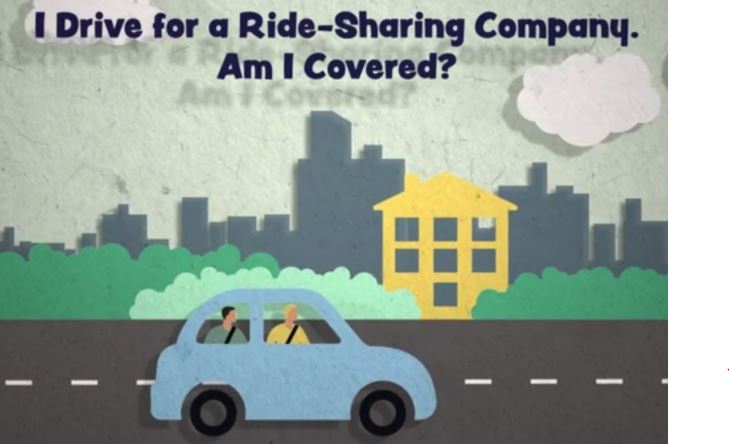Rideshare driver insurance coverage of accidents is also important because people avail themselves of the opportunity for adaptable income by joining the ranks of rideshare drivers. Rideshare has risk, so cover this risk with the rideshare driver’s available accident coverage insurance. More than single-ride driving, regardless of whether you’re the one behind the wheel for Uber, Lyft, or any other rideshare platform, having a comprehensive understanding of the intricacies related to rideshare driver accident coverage is paramount. Within this guide, we will thoroughly explore the essential aspects you need to comprehend regarding this specific coverage, highlighting its importance, elucidating the diverse coverage alternatives, and offering pragmatic approaches to ensure you can utilize it to your advantage proficiently.

Recognizing the Importance of Rideshare Driver Insurance Coverage
Rideshare driving brings unique advantages, but it also carries inherent risks. Unlike traditional taxi drivers, rideshare drivers use their personal vehicles for commercial purposes, creating a gap in insurance coverage that standard personal auto policies often do not address. Here’s why rideshare driver accident coverage is a vital piece of the puzzle:
- Income Protection: Imagine being unable to drive and losing your primary source of income due to an accident. Rideshare driver accident coverage steps in to provide financial support during such challenging times.
- Meeting Legal Requirements: Various regions have specific insurance mandates for rideshare companies and their drivers. Failing to comply with these requirements can result in legal repercussions, making proper coverage a necessity.
- Ensuring Passenger Safety: Passengers put their trust in you to provide a safe and secure ride. Having the right insurance coverage ensures you can meet their expectations in case of an accident.

Exploring the Types of Rideshare Driver Insurance
Rideshare driver accident coverage typically consists of multiple components, each designed to serve a distinct purpose. Let’s delve into the primary types of coverage that rideshare drivers should be aware of:
- Personal Auto Insurance: Your personal auto insurance policy covers you during personal vehicle use. However, it may not extend coverage when you’re actively engaged in rideshare activities. Some insurers offer rideshare endorsements or add-ons to bridge this gap.
- Rideshare Company Insurance: Companies like Uber and Lyft provide insurance coverage for their drivers while they’re actively using the app with a passenger in the vehicle. This coverage usually includes liability, collision, and uninsured/underinsured motorist protection.
- Contingent Liability Coverage: This coverage kicks in when you’re driving for a rideshare company but don’t have a passenger. It provides liability protection if your personal auto insurance doesn’t cover this scenario.
- Gap Insurance: Gap insurance covers the financial “gap” between the actual cash value of your vehicle (what your insurer would pay) and the amount you owe on your auto loan or lease. It’s especially important for rideshare drivers with financed vehicles.
- Rental Car Reimbursement: If your vehicle is damaged in an accident, rental car reimbursement coverage can help offset the cost of a temporary replacement vehicle while yours is being repaired.
- Medical Payments Coverage: This coverage assists in covering medical expenses for both you and your passengers in the event you’re injured in an accident while driving for a rideshare company.
- Uninsured/Underinsured Motorist Coverage: In situations where you’re in an accident with an uninsured or underinsured driver, this insurance type steps in to protect you.

Strategies for Maximizing Your Rideshare Driver Insurance
To make the most of your rideshare driver accident coverage, consider the following strategies:
- Know Your Policy: Thoroughly review your personal auto insurance policy and the insurance provided by the rideshare company. Understanding the specifics of your coverage is vital.
- Notify Your Insurer: Inform your personal auto insurance provider about your rideshare activities. Some insurers may require you to purchase a rideshare endorsement to maintain continuous coverage.
- Keep Detailed Records: Maintain accurate records of your rideshare activities, including active app use and completed trips. These records are invaluable when dealing with accidents.
- Prompt Accident Reporting: In the unfortunate event of an accident while driving for a rideshare company, report it promptly to both your personal auto insurer and the rideshare company. Timely reporting streamlines the claims process.
- Consider Additional Coverage: Depending on your individual circumstances and risk tolerance, explore the possibility of obtaining additional rideshare-specific insurance policies to enhance your overall protection.
Pros of Rideshare Driver Insurance:
- Enhanced Coverage During Rideshare Activities: Rideshare driver insurance provides specialized coverage that kicks in when you’re actively working for a rideshare platform like Uber or Lyft. This ensures you’re protected during the times when your personal auto insurance may not cover you, giving you peace of mind while on the job.
- Compliance with Legal Requirements: Many regions and rideshare companies require drivers to maintain adequate insurance coverage while working on the platform.
Cons of Rideshare Driver Insurance:
- Additional Cost: Rideshare driver insurance comes at an extra expense on top of your regular personal auto insurance. This can increase the overall cost of being a rideshare driver, affecting your profitability.
- Limited Availability: Rideshare driver insurance may not be universally available from all insurance providers in all regions. This limited availability can make it more challenging to find the right coverage, potentially limiting your choices and driving up costs.
In summary, rideshare driver insurance offers specialized coverage during rideshare activities and ensures legal compliance.
Conclusion
Rideshare driver insurance is a fundamental element in securing the financial well-being of rideshare drivers. Recognizing its significance, understanding the various coverage types available, and implementing strategies to maximize its benefits are essential components of navigating the gig economy safely.
A rideshare driver’s livelihood and financial security are closely tied to his vehicle. By assessing rideshare insurance needs, communicating effectively with rideshare’s insurer, and staying well-informed about the available coverage options, you can ensure that you’re adequately shielded in case of an accident. Remember that preparation is the key to enjoying the benefits of rideshare driving while minimizing the associated risks.



